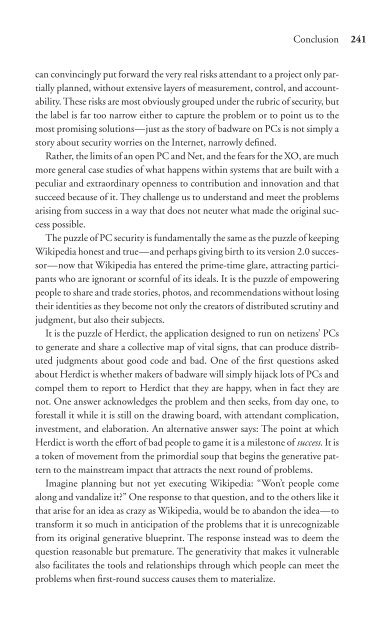Download - Future of the Internet â And how to stop it.
Download - Future of the Internet â And how to stop it.
Download - Future of the Internet â And how to stop it.
Create successful ePaper yourself
Turn your PDF publications into a flip-book with our unique Google optimized e-Paper software.
Conclusion 241<br />
can convincingly put forward <strong>the</strong> very real risks attendant <strong>to</strong> a project only partially<br />
planned, w<strong>it</strong>hout extensive layers <strong>of</strong> measurement, control, and accountabil<strong>it</strong>y.<br />
These risks are most obviously grouped under <strong>the</strong> rubric <strong>of</strong> secur<strong>it</strong>y, but<br />
<strong>the</strong> label is far <strong>to</strong>o narrow ei<strong>the</strong>r <strong>to</strong> capture <strong>the</strong> problem or <strong>to</strong> point us <strong>to</strong> <strong>the</strong><br />
most promising solutions—just as <strong>the</strong> s<strong>to</strong>ry <strong>of</strong> badware on PCs is not simply a<br />
s<strong>to</strong>ry about secur<strong>it</strong>y worries on <strong>the</strong> <strong>Internet</strong>, narrowly defined.<br />
Ra<strong>the</strong>r, <strong>the</strong> lim<strong>it</strong>s <strong>of</strong> an open PC and Net, and <strong>the</strong> fears for <strong>the</strong> XO, are much<br />
more general case studies <strong>of</strong> what happens w<strong>it</strong>hin systems that are built w<strong>it</strong>h a<br />
peculiar and extraordinary openness <strong>to</strong> contribution and innovation and that<br />
succeed because <strong>of</strong> <strong>it</strong>. They challenge us <strong>to</strong> understand and meet <strong>the</strong> problems<br />
arising from success in a way that does not neuter what made <strong>the</strong> original success<br />
possible.<br />
The puzzle <strong>of</strong> PC secur<strong>it</strong>y is fundamentally <strong>the</strong> same as <strong>the</strong> puzzle <strong>of</strong> keeping<br />
Wikipedia honest and true—and perhaps giving birth <strong>to</strong> <strong>it</strong>s version 2.0 successor—now<br />
that Wikipedia has entered <strong>the</strong> prime-time glare, attracting participants<br />
who are ignorant or scornful <strong>of</strong> <strong>it</strong>s ideals. It is <strong>the</strong> puzzle <strong>of</strong> empowering<br />
people <strong>to</strong> share and trade s<strong>to</strong>ries, pho<strong>to</strong>s, and recommendations w<strong>it</strong>hout losing<br />
<strong>the</strong>ir ident<strong>it</strong>ies as <strong>the</strong>y become not only <strong>the</strong> crea<strong>to</strong>rs <strong>of</strong> distributed scrutiny and<br />
judgment, but also <strong>the</strong>ir subjects.<br />
It is <strong>the</strong> puzzle <strong>of</strong> Herdict, <strong>the</strong> application designed <strong>to</strong> run on netizens’ PCs<br />
<strong>to</strong> generate and share a collective map <strong>of</strong> v<strong>it</strong>al signs, that can produce distributed<br />
judgments about good code and bad. One <strong>of</strong> <strong>the</strong> first questions asked<br />
about Herdict is whe<strong>the</strong>r makers <strong>of</strong> badware will simply hijack lots <strong>of</strong> PCs and<br />
compel <strong>the</strong>m <strong>to</strong> report <strong>to</strong> Herdict that <strong>the</strong>y are happy, when in fact <strong>the</strong>y are<br />
not. One answer acknowledges <strong>the</strong> problem and <strong>the</strong>n seeks, from day one, <strong>to</strong><br />
forestall <strong>it</strong> while <strong>it</strong> is still on <strong>the</strong> drawing board, w<strong>it</strong>h attendant complication,<br />
investment, and elaboration. An alternative answer says: The point at which<br />
Herdict is worth <strong>the</strong> effort <strong>of</strong> bad people <strong>to</strong> game <strong>it</strong> is a miles<strong>to</strong>ne <strong>of</strong> success. It is<br />
a <strong>to</strong>ken <strong>of</strong> movement from <strong>the</strong> primordial soup that begins <strong>the</strong> generative pattern<br />
<strong>to</strong> <strong>the</strong> mainstream impact that attracts <strong>the</strong> next round <strong>of</strong> problems.<br />
Imagine planning but not yet executing Wikipedia: “Won’t people come<br />
along and vandalize <strong>it</strong>” One response <strong>to</strong> that question, and <strong>to</strong> <strong>the</strong> o<strong>the</strong>rs like <strong>it</strong><br />
that arise for an idea as crazy as Wikipedia, would be <strong>to</strong> abandon <strong>the</strong> idea—<strong>to</strong><br />
transform <strong>it</strong> so much in anticipation <strong>of</strong> <strong>the</strong> problems that <strong>it</strong> is unrecognizable<br />
from <strong>it</strong>s original generative blueprint. The response instead was <strong>to</strong> deem <strong>the</strong><br />
question reasonable but premature. The generativ<strong>it</strong>y that makes <strong>it</strong> vulnerable<br />
also facil<strong>it</strong>ates <strong>the</strong> <strong>to</strong>ols and relationships through which people can meet <strong>the</strong><br />
problems when first-round success causes <strong>the</strong>m <strong>to</strong> materialize.


